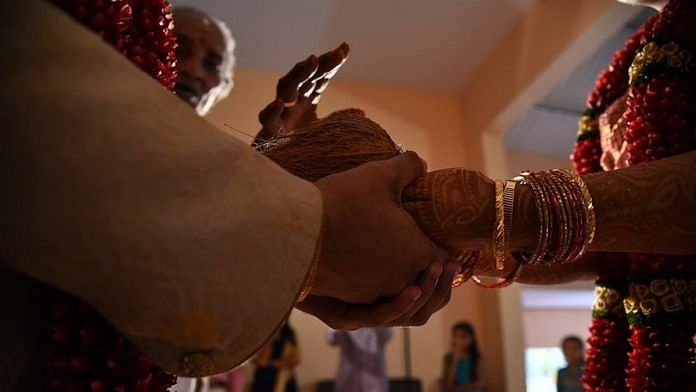Does the Uttarakhand Uniform Civil Code actually ensure gender justice? The government of Pushkar Singh Dhami would have you believe so. It points to the abolition of polygamy and all forms of out-of-court divorce among Muslims, and equal succession rights within the legislation. The Uttarakhand government would have you believe that only the Muslim personal law is uniquely discriminatory towards women and that compelling Muslims to follow Hindu law—disguised as a “uniform” civil code—is all that is needed for gender equity.
The truth is quite something else.
Personal laws across religions in India discriminate against women in several ways. The Uttarakhand government has reproduced these gender unjust laws in the name of “uniformity”. Here, we pick three areas where the Uttarakhand UCC (UUCC) perpetuates gender injustice.
First, it does not protect women already in polygamous marriages. Second, it denies women their fair share of assets after the dissolution of marriage. And third, it treats mothers as inferior to fathers regarding guardianship of children.
Also Read: Uttarakhand UCC resembles colonial South African law. Kasturba Gandhi fought against it
Protecting second wives
The UUCC prohibits polygamy across religions, effectively extending the ban that existed for Hindus and other religions to Muslims. However, data shows that rates of polygamous marriages in India are comparable across religions. For instance, the National Family Health Survey 2019-2020 found that 1 out of every 70 surveyed women was in a polygamous marriage. In Uttarakhand, the rates of polygyny were 1.5 per cent for Muslims and 0.7 per cent for Hindus. Given Uttarakhand’s Hindu majority, more Hindu women are likely to be in polygynous marriages than Muslim women.
The fact is that women in extra-legal polygamous marriages may be worse off than those in legally valid ones. Under Muslim personal law, all wives enjoy equal status regarding maintenance and inheritance. However, in extra-legal marriages, such rights are not available to subsequent wives. While recognising polygamy as a legitimate practice is not the way to safeguard women’s interests, it is critical to account for persisting extra-legal “marriages” and the vulnerability of women.
While the UUCC improves inheritance rights for wives in valid polygamous marriages, it lacks adequate protection mechanisms for women in extra-legal marriages, as the practice persists despite being outlawed. Merely prohibiting polygamy isn’t a sufficient safeguard for second wives.
The UUCC states that if a man had more than one wife before the code’s enactment, each would have a claim to maintenance. But it fails to clarify whether marriages must be legally valid. As courts hesitate to extend maintenance rights to second wives in extra-legal marriages, it is uncertain whether the UUCC will protect them.
Weak protections after marriage ends
Another major area in family law that requires reform is extending robust protections for wives after marriage dissolution. Under current law, maintenance and alimony are the only safeguards for protecting women in such cases. However, maintenance laws, informed by the outdated principle of preventing destitution rather than ensuring dignity, fall short. The Supreme Court has attempted to address this by outlining factors to consider when determining maintenance, to ensure equal sharing of marital assets between husband and wife. But the UUCC fails to engage with such judicial developments, missing an opportunity to codify them.
Further, India presently follows the doctrine of separation of assets upon marriage dissolution. Essentially, this means property division between spouses is based on individual ownership titles. This regime does not account for women’s non-financial contributions during marriage, or the fact that men are more likely to hold property titles. Courts have repeatedly urged the legislature to enact laws protecting women’s interests in matrimonial property and accounting for a wife’s non-financial contributions. Additionally, a matrimonial property regime has been recommended to ensure women’s economic protection in marriage. Unsurprisingly, the UUCC maintains the status quo here, failing to address a major area of family law in need of reform.
Also Read: Excluding STs from Uttarakhand UCC exposes a fundamental problem in its concept
Mothers less than fathers?
Under India’s current family law regime, discriminatory guardianship laws govern parent-child relationships. All personal laws follow the outdated common law principle treating the father as the child’s natural guardian and the mother as merely a custodian. The guardian has decision-making power regarding the child and property, but the custodian is relegated to a caretaking role. Thus, guardianship laws continue to discriminate on the basis of gender by denying mothers equal status.
The Law Commission has repeatedly recommended treating both parents as equal guardians. Despite this, neither the legislature nor the Supreme Court has been willing to do away with such discriminatory provisions. The UUCC could have been a great opportunity to correct the course, but it is completely silent on guardianship matters. Given this silence in the Bill, personal law on guardianship will persist, keeping mothers secondary.
Clearly then, the UUCC does not sufficiently engage with the ramifications of its proposed policies. It is a lethargic and unimaginative exercise marketed as a gender-just template. As this piece shows, while equal succession rights are laudable in principle, operational mechanisms have not been built into the law. As such, the UUCC falters in proposing a truly gender-just and inclusive regime and remains nothing more than an eye-wash in this regard.
Namrata Mukherjee and Rakshita Goyal are part of the Vidhi Centre for Legal Policy. Views are personal.
(Edited by Asavari Singh)



